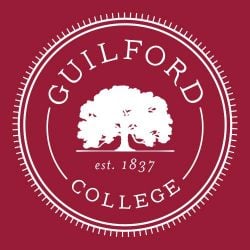Mellon Grant paves the way to digital scholarship

From digitally mapping the Silk Road to attending conferences about digital scholarship, Guilford College faculty and students have been developing their digital literacy for three years.
In the spring of 2014, Guilford received a $100,000 grant from the Andrew W. Mellon Foundation, an organization that supports projects focusing on the arts and humanities. Since then, Guilford faculty and students have been participating in projects that emphasize enhancing digital scholarship.
Guilford held a celebration of the accomplishments of these projects on Friday, Sept. 22, in the experimental classroom in Hege Library.
Faculty and students who had been involved in the projects gathered to view a video produced by Chad Phillips, visiting assistant professor of theatre studies, and junior Erin Kye, a film studies minor. The video featured interviews with those involved speaking on what they were able to accomplish with the aid of the grant.
“(The video is) something that we’ll be able to use to help us with fundraising efforts, with further grant seeking opportunities,” said Suzanne Bartels, director of Hege Library and learning technologies. “And it’s also just a real feel good I think. I really thank Chad for doing this and Erin.”
The video shown at the celebration was also a project supported by the Mellon grant.
“Before we watch the piece, I just want to say that Mellon keeps giving in a way that allowed me to connect with people that otherwise I really wouldn’t have talked to,” said Phillips.
“So, it was really great to just have these discussions about Mellon … because it’s honestly led to me connecting with other faculty members regardless of this project.”
One of the projects highlighted in the celebration was Guilford’s digital Silk Road website, an endeavor supported by the Mellon grant which included student research, technological skills and a trip to China.
“I’m really grateful that I got this grant,” said Zhihong Chen, associate professor of history.
“It enabled me to do several things simultaneously. One is that it allowed me the opportunity to do a semester-long team teaching with Religious Studies Professor Eric Mortensen, the digital Silk Road.”
Chen and Mortensen collaborated on teaching a class about digitally mapping the Silk Road. Students worked in teams, researched their topic of interest related to the Silk Road and mapped points along the route online.
“The student final projects were story maps, digitally embedded into a common shared map on a brand new Guilford-hosted website,” said Mortensen. “We managed all that in one semester.”
The class was offered in fall of 2016 and during the following January term, students went to China and traveled along the route of the Silk Road.
“We traveled horizontally across pretty much all of China in three weeks, which was crazy and amazing because you saw how landscapes change as you go,” said senior Anna Kelly, who was one of the teaching assistants for the class.
“We saw how culture evolves as you move geographically, and after spending a semester studying that area, being able to actually see it in front of you is really incredible.”
The digital nature of the class and project made students recognize the longevity of the Silk Road map they had created.
“Being a TA in a digital mapping of the Silk Road class was a phenomenal experience because it’s very paperless, in a way,” said senior Brian James, also an art teaching assistant.
“To TA these groups of students that are very enthusiastic to learn and to watch them map out the points … the whole process of it was very bonding as well as educational.
“I realize that this is not just something for fun … but this is for everyone else to share and to build upon. So I thought to be part of that system was phenomenal.”
Although the grant period is now over, Guilford faculty will continue to encourage the development of digital scholarship and the resulting projects.
One way to do this will be through the IDEA incubator classroom, which was a project created through the Mellon grant and will remain in use.
“It’s a space for people to be able to come together, to do collaborations, to have the time and the area to be able to just think and dream and whatever they need to do to be able to come up with different types of projects,” said Melanie Lee-Brown, professor of biology and director of research and creative endeavors.
The projects supported by the Mellon grant are still being documented to emphasize their impact on Guilford’s digital scholarship.
“The good news about Mellon is that there’s so many stories to tell that we’re adding to them after today,” said Phillips.








